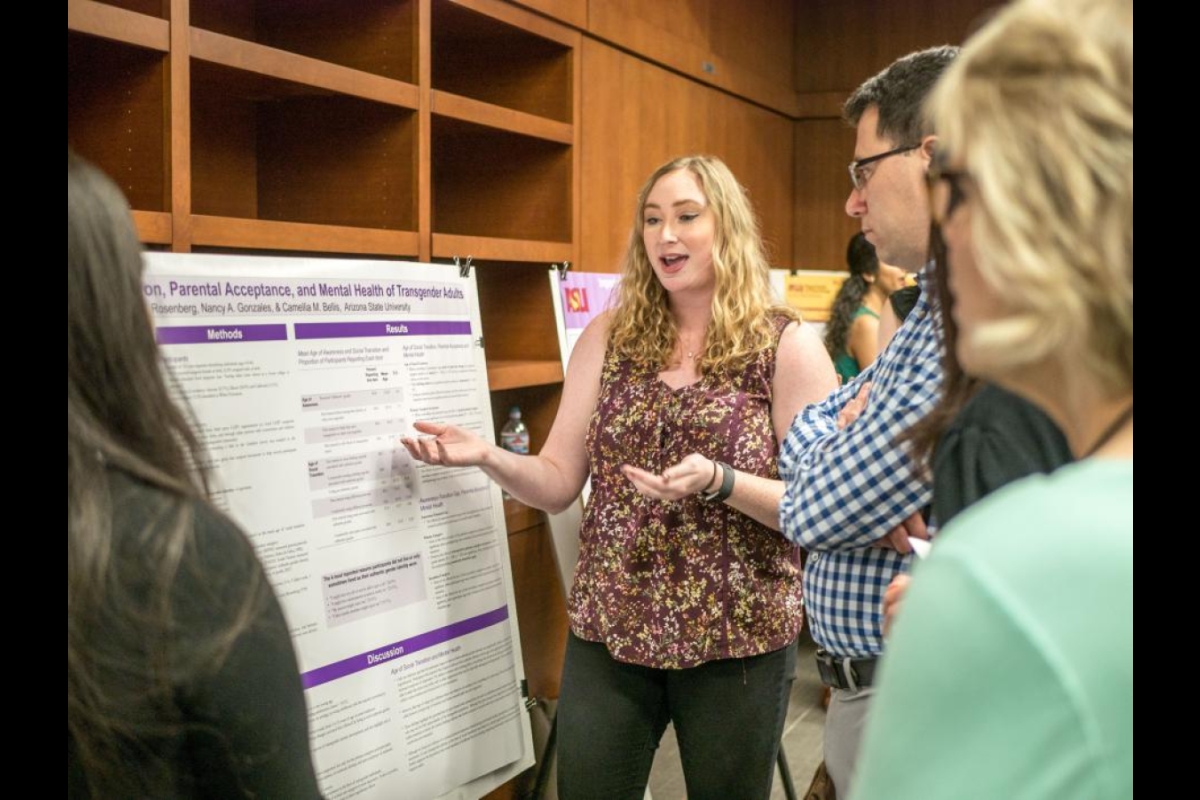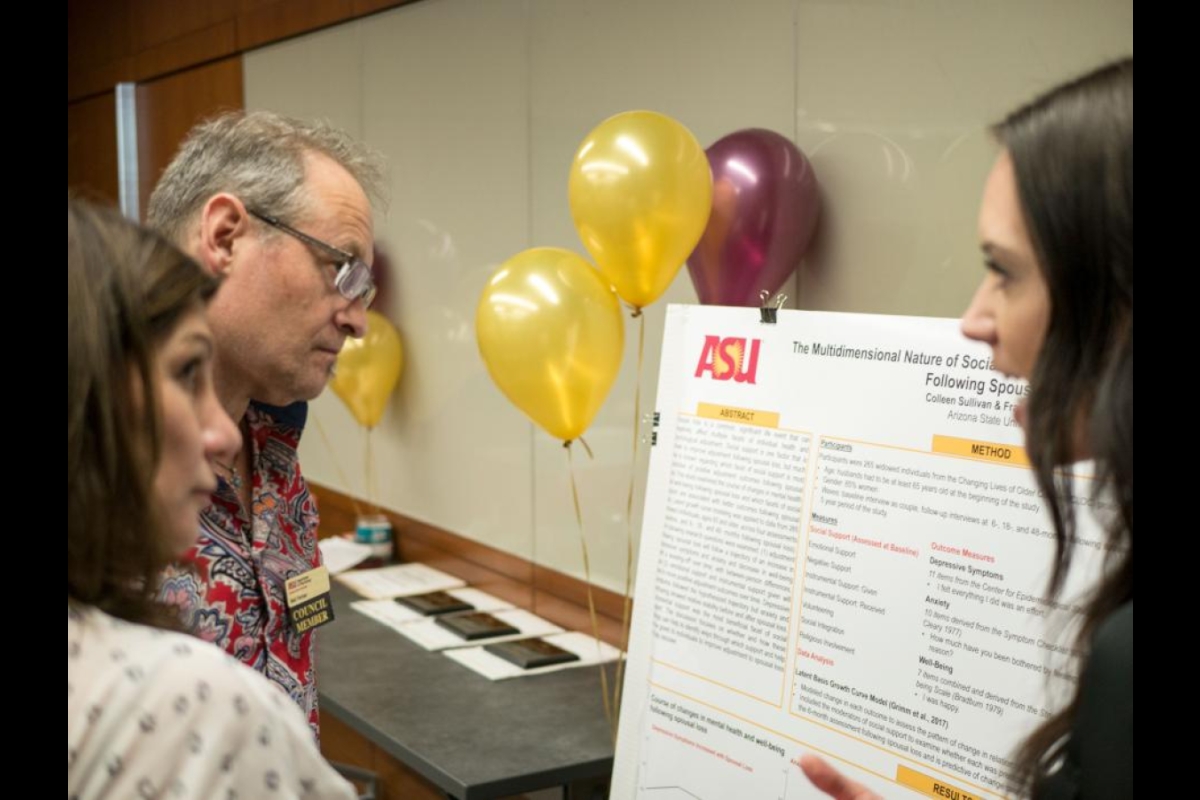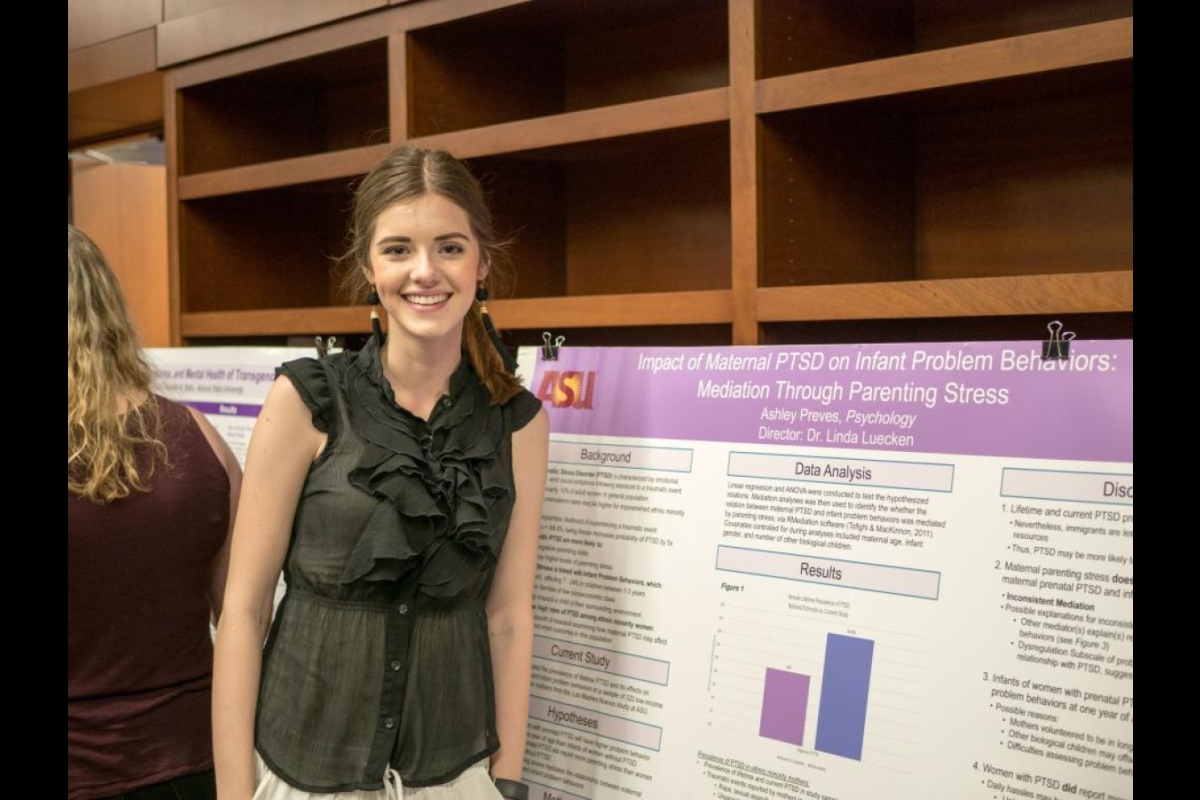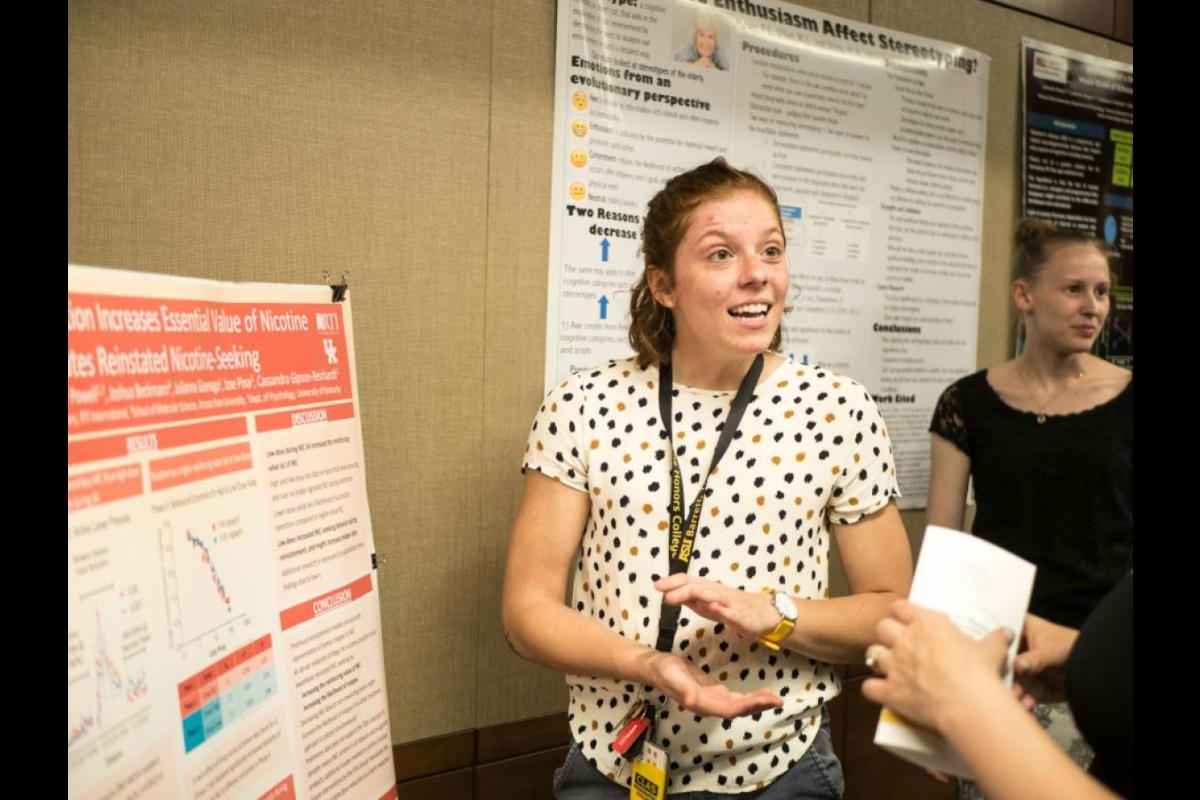ASU psychology students compete for best research thesis
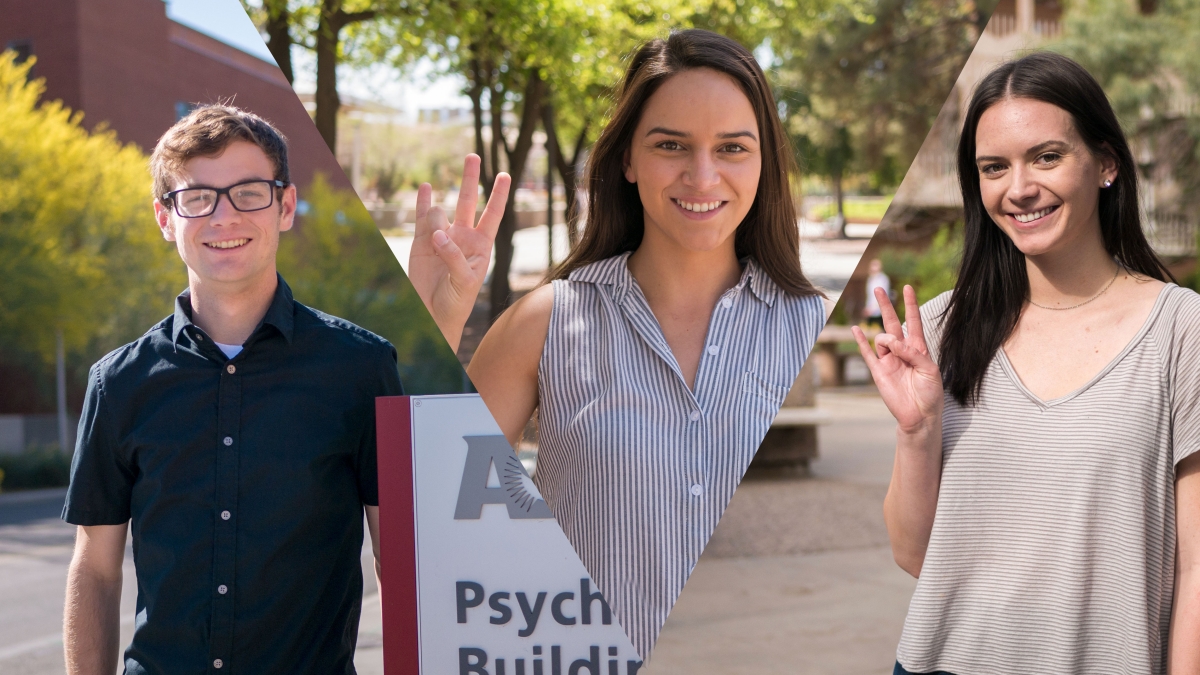
Undergraduate Best Thesis finalists: Justin Palmer, Anaelle Ganase, and Colleen Sullivan. Photo by Robert Ewing
Arizona State University Department of Psychology undergraduate students showed off their research findings to their peers, faculty and family at the annual Psychology Honor Theses Poster Session and Undergraduate Awards on April 12.
The students worked all year in psychology labs, conducting innovative research.
“The quality of these research projects is something you would expect to see in graduate-level theses,” said Clark Presson, professor of psychology and director of undergraduate studies. “These exceptional undergraduates make the Department of Psychology look great.”
For the past 12 years, the Department of Psychology, with the support of Barrett, The Honors College, has hosted a competition to determine the best undergraduate research theses, added Presson, who also coordinates the Psychology Honors Program.
There were three finalists for the best thesis award: Colleen Sullivan, Justin Palmer and Anaelle Ganase. Sullivan, Palmer and Ganase each invited a scholar of their choice from across the country. Each student defended their research to a committee made up of the invited scholars and faculty from the department. After the research presentations, the panelists and three invited scholars deliberated and selected a winner based on the quality of the student’s research and presentation.
All of this year’s finalists are seniors with goals of attending graduate school.
“The work that these three did was so spectacular,” Presson said. “We are very proud of all of them!”
Justin Palmer — Winner, Best Undergraduate Thesis
Palmer completed the research for his thesis, “An Evaluation of the Cognitive Effects of a Short-Term and a Long-Term Ovarian Hormone Deprivation in a Transgenic Mouse Model of Alzheimer’s Disease: Addressing the Critical Window” in the Neuroscience of Memory and Aging Lab, led by Heather Bimonte-Nelson, professor of psychology.
A native of North Royalton, Ohio, Palmer found his calling at ASU.
“It was hard leaving my friends and family, but it forced me to grow as a person,” Palmer said. “I found the faculty of the ASU psychology department to be devoted mentors.”
Palmer’s interest in psychology began in high school after he shadowed a neurologist. He is especially interested in neurodegenerative diseases and whether early detection provides a window of opportunity for future treatments.
After ASU, Palmer will pursue his doctorate in clinical psychology with Lee Ryan, professor of psychology, at the University of Arizona.
Anaelle Ganase — Finalist, Best Undergraduate Thesis
Ganase worked with Kathy Lemery-Chalfant, professor of psychology, on her thesis, “Understanding Emotion Dynamics and Observed Cooperation and Conflict in the Sibling Relationship.”
Ganase studied how conflict among siblings helped or hindered their long-term development.
"Conflictual interactions between siblings really matter, and the current literature right now has a general consensus that conflict is purely negative. This research is important because it shows that isn't necessarily true and that conflict between siblings helps early development," Ganase said.
She is passionate about studying autism and plans to pursue a doctorate in clinical psychology at some point in the future.
Her advice for incoming students is to get involved early on in research because it will make your academic studies more applicable and accessible.
Colleen Sullivan — Finalist, Best Undergraduate Thesis
Sullivan completed her thesis, “The Multidimensional Nature of Social Support in Contributing to Adjustment Following Spousal Loss” in the Pathways to Character Lab, led by Frank Infurna, assistant professor of psychology.
Sullivan’s end goal is different from many of her peers because she wants to be a forensic psychologist. Her interest in forensic psychology stems from when she was in the fifth grade and watched a documentary on the Zodiac Killer. She became fascinated with the career path of a forensic psychologist.
“There was a woman in the documentary who described the crimes and possible motives of the Zodiac Killer,” Sullivan said. “I was hooked, and as soon as I found out she was a trained forensic psychologist, I immediately decided that was the career for me.”
Sullivan cited the prestigious and knowledgeable professors and the research opportunities in the many disciplines within psychology as the reasons she attended ASU.
After graduation, Sullivan will begin pursuing the MS in Criminology and Criminal Justice through ASU’s School of Criminology and Criminal Justice.
Additional students who participated in the Psychology Honors Theses Poster Session and Undergraduate Awards:
• Hira Ali presented "Parental Impact on Adolescent Prosocial Behavior at Socioeconomic Status Extremes" based on work with Suniya Luthar, professor of psychology.
• Gabriella Cabrera-Brown presented "Analysis of Economic Demand for Nicotine Using an Abbreviated Behavioral Economic Protocol in Rats" based on work with Cassandra Gipson-Reichardt, professor of psychology.
• Ashlyn Gonzales presented "Benefits of high intelligence: Potential moderating effects of emotion regulation and friendship quality" based on work with Suniya Luthar, professor of psychology.
• Sydney Harrison presented "The Comparison of Frontostriatal Tracts Between ADHD Adolescents and a Typically Developing Adolescent Control Group" based on work with Sam McClure, professor of psychology.
• Kate Horner presented "Early Adolescent Socialization: The Effects of Internet and Technology Use in Grades 7-8" based on work with Danielle McNamara, professor of psychology.
• Victoria Jacoby presented "The Impact of Blocked vs. Distributed Category Learning on Subsequent Generalization" based on work with Donald Homa, professor of psychology.
• Jamie Josephs presented "Culturally Motivated Clinician Drift in the Treatment of Eating Disorders: How Clinicians Adopt, Adapt, or Abandon CBT for Latino Clients" based on work with Marisol Perez, associate professor of psychology.
• Navneet Kaur presented "Bidirectional Relationship Between Parenting and Problem Behaviors: A Longitudinal Genetically Informed Design" based on work with Kathryn Lemery-Chalfant, professor of psychology.
• Paige Murwin presented "Do Awe and Enthusiasm Affect Stereotyping?" based on work with Michelle "Lani" Shiota, associate professor of psychology.
• Ashley Preves presented "Impact of Maternal PTSD on Infant Problem Behaviors: Mediation Through Parenting Stress" based on work with Linda Leucken, professor of psychology.
• Samantha Rodrigues presented "Impact of Family Support on Early Childhood Dysregulation in the Context of Maternal Depression" based on work with Linda Leucken, professor of psychology.
• Beth Rosenberg presented "Age of Social Transition, Parental Acceptance, and Mental Health of Transgender Adults" based on work with Nancy Gonzales, Foundation Professor of psychology.
• Ariana Ruof presented "Predictors of Effortful Control in Early Adolescence" based on work with Laurie Chassin, professor of psychology.
• Shaikhameedha Shaikjamaludeen presented "Growth Mindset and Future Self-Connectedness as Explanations for Cultural Differences in Self-Improvement" based on work with Virginia Kwan, professor of psychology.
• Jacyln Stack presented "Effects of Parental Monitoring, Parental Autonomy-Giving, and Personal Autonomy on Drinking Behaviors during the Transition from High School to College" based on work with Will Corbin, professor of psychology.
• Krysten Sullivan presented "Exploring the Relation between Confidence and Accuracy in Recognition Memory" based on work with Gene Brewer, associate professor of psychology.
• Emily Taracena presented "Differences among High-Achieving Adolescents in Day Schools and Boarding Schools" based on work with Suniya Luthar, professor of psychology.
• Margaret Drury presented "Xenophobia: The Amicable or Exploitative Preference for Members of an Outgroup" based on work with Steven Neuberg, foundation professor of psychology and chair.
More Science and technology

ASU-led space telescope is ready to fly
The Star Planet Activity Research CubeSat, or SPARCS, a small space telescope that will monitor the flares and sunspot activity…

ASU at the heart of the state's revitalized microelectronics industry
A stronger local economy, more reliable technology, and a future where our computers and devices do the impossible: that’s the…

Breakthrough copper alloy achieves unprecedented high-temperature performance
A team of researchers from Arizona State University, the U.S. Army Research Laboratory, Lehigh University and Louisiana State…


